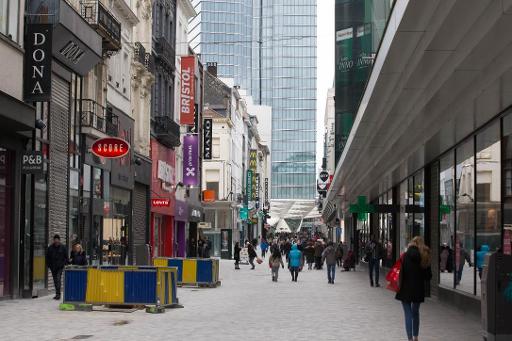Commerce in Brussels will suffer the impact of the downturn in tourist activity for a long time to come, according to a new report published on Monday by Brussels Studies.
The report takes stock of the knowledge available on trade in Brussels and makes a series of recommendations to decision-makers. It was written on the eve of Belgium's lockdown by a team of researchers from the Free University of Brussels (ULB) and company managers from GroupOne.
Unlike the aftermath of the terrorist attacks in Brussels, the coronavirus (Covid-19) crisis and its immediate repercussions in terms of tourist travel will have a more lasting impact on businesses, especially those that depend most heavily on supra-local demand, they warned.
Related News
- Brussels chamber of commerce: Hotel Metropole is only the first domino to fall
- Coronavirus has cost Brussels economy five billion, says trade federation
With approximately 20,700 points of sale of goods and services of a commercial nature in 2017, the distribution sector in Brussels is distinguished by its economic importance: it accounted for 9% of regional employment in 2018, or nearly 61,000 employees in full-time equivalents, of which 70% are low-skilled and a majority is from Brussels.
In Brussels, the sale of goods (food, personal and household goods and leisure goods) represents 10,195 outlets, or almost half. The hospitality sector accounts for 5,100 establishments (25%); commercial services for 4,407 (21%) and finally, the sale of vehicles and services associated with transport for 994 (5%).
"It is clear that today tourism policy and trade policy are handled too separately," according to the authors. "This is conceivable if one considers trade" as a derivative of tourism, "but it is precisely the time not to consider trade as a simple beneficiary of tourism, but rather as an actor contributing to the ecosystem of urban tourism," they said.
This implies acting also on potentially more stable flows than those of tourism, according to the report. This would include limiting commercial evasion, even if it would be hard to prevent Brussels residents from shopping outside of their city. Conversely, commuters probably contribute significantly to the vitality of certain segments of Brussels commerce and would deserve more attention.
More broadly, the authors advocated the development of a permanent reflection by all actors to keep the city welcoming for commerce and encourage its diversity.
They argue for the regulation of e-commerce, which, they say, puts urban freight systems to the test, particularly in terms of sustainability.
"The bankruptcies and reorganizations that will result from the Covid-19 crisis will undoubtedly make the reinvention of commerce and its support all the more essential," they insisted.
The Brussels Times

